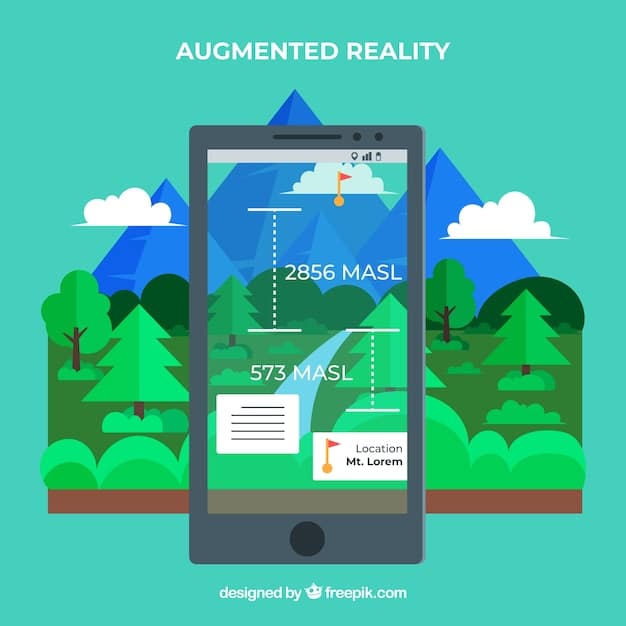AI Revolution: Impact on PC Game Dev in the Next 2 Years

The impact of AI on PC game development is expected to revolutionize various aspects of the industry over the next two years, from streamlining content creation and enhancing player experiences to enabling more personalized and adaptive gameplay.
The gaming world is on the cusp of a significant transformation, largely driven by advancements in artificial intelligence. The impact of AI on PC game development: What to expect in the next 2 years is profound, promising to reshape how games are created, experienced, and enjoyed.
AI-Powered Asset Creation
AI is rapidly changing how game assets are created, offering developers new tools and workflows. This ranges from generating textures and models to composing music and designing sound effects.
Procedural Content Generation
AI algorithms can generate vast amounts of diverse content, from landscapes to building interiors, reducing the need for manual creation and enabling more expansive and dynamic game worlds.
Smart Texture Creation
AI can analyze existing textures and create variations or entirely new textures that fit the aesthetic of a game, ensuring consistency and saving artists significant time.
- Reduces development time by automating repetitive tasks.
- Enables the creation of more diverse and detailed game worlds.
- Lowers production costs by reducing the need for large art teams.

AI’s ability to accelerate and enhance asset creation is poised to become a standard practice, allowing developers to focus on higher-level design and innovation, ultimately improving the quality and scope of PC games.
Enhanced Player Experiences
AI is not only transforming game development but also enriching the player experience. This includes creating more intelligent and responsive NPCs, adaptive difficulty levels, and personalized game experiences.
Intelligent NPCs
AI-driven Non-Player Characters (NPCs) can exhibit more realistic behaviors, learn from player interactions, and react in ways that make the game world feel more alive and dynamic.
Adaptive Difficulty
AI can adjust the game’s difficulty in real-time based on the player’s skill level, ensuring a challenging yet enjoyable experience for players of all abilities.
These AI enhancements can transform a standard game into a deeply engaging and uniquely tailored adventure for each player, promoting longer playtime and greater satisfaction.
AI-Driven Game Testing and QA
Game testing and Quality Assurance (QA) are critical stages in game development, and AI is making these processes more efficient and thorough.
Automated Bug Detection
AI algorithms can automatically identify bugs and glitches by simulating various gameplay scenarios, reducing the reliance on human testers for routine tasks.
Predictive Testing
AI can predict potential issues based on code analysis and gameplay data, allowing developers to address problems proactively before they affect the player experience.
- Accelerates the testing process, reducing time-to-market.
- Improves the overall quality and stability of PC games.
- Reduces development costs by identifying and fixing issues earlier.
AI-driven testing is set to become a staple in game development, ensuring that PC games are more polished and bug-free upon release.
AI in Game Design and Level Creation
AI is increasingly being used to assist in core game design tasks, from creating compelling narratives to designing intricate levels. This technology opens new avenues for creativity and efficiency.
AI-Assisted Level Design
AI can generate level layouts that are both challenging and visually appealing, offering developers a starting point for creating unique and engaging environments.
Narrative Generation
AI can assist in crafting dynamic and branching narratives, providing players with more personalized and immersive story experiences.

The integration of AI in game design is empowering developers to push the boundaries of creativity, resulting in more innovative and engaging PC games that cater to a wider range of player preferences.
The Rise of AI-Powered Tools and SDKs
The availability of AI-powered tools and Software Development Kits (SDKs) is growing, making it easier for developers to integrate AI into their projects. These tools range from simple AI assistants to comprehensive AI platforms.
User-Friendly AI Platforms
Platforms like Unity ML-Agents and TensorFlow provide accessible interfaces for developers to train and deploy AI models in their games.
Real-Time AI Assistants
AI assistants can offer real-time suggestions and feedback during the development process, helping developers make informed decisions and optimize their workflow.
- Democratizes AI development, making it accessible to smaller teams and indie developers.
- Reduces the learning curve for AI integration, accelerating adoption.
- Encourages experimentation and innovation in AI-driven game design.
The increasing availability of AI tools and SDKs is fostering a new wave of AI-driven innovation in PC game development, creating a more level playing field for developers of all sizes.
Challenges and Considerations
While AI offers numerous benefits there are also challenges and considerations to address. These include ethical concerns, the need for human oversight, and the potential for job displacement.
Ethical Considerations
AI-generated content must be carefully reviewed to ensure it aligns with ethical standards and avoids bias or harmful stereotypes.
The Need for Human Oversight
AI should be viewed as a tool to augment human creativity, not replace it entirely. Human oversight is essential to ensure that AI-driven processes align with the overall vision of the game.
Addressing these challenges proactively will ensure that AI is used responsibly in PC game development, promoting both innovation and ethical practices.
| Key Point | Brief Description |
|---|---|
| 🤖 AI Asset Creation | AI speeds up asset creation, generating textures and models. |
| 🎮 Enhanced Experiences | AI creates smarter NPCs & adaptive difficulty levels. |
| 🐞 Game Testing | AI automates bug detection, ensuring higher quality games. |
| 🎨 AI Design | AI assists with level and narrative design, boosting creativity. |
Frequently Asked Questions
▼
AI automates repetitive tasks, generates varied content, and creates smart textures, reducing development time and enabling more detailed worlds. This allows artists to concentrate on innovative design elements.
▼
AI enhances player experiences by creating intelligent NPCs with realistic behaviors and adaptive difficulty levels tailored to each player. This results in more personalized and engaging gameplay.
▼
AI automates bug detection and assesses potential issues through code and gameplay data analysis. This predictive testing reduces time-to-market and ensures a polished, bug-free release, improving overall game stability.
▼
AI is now used to design intricate level layouts and generate dynamic narratives, offering players more immersive and tailored story experiences. This integration empowers developers to push creative boundaries.
▼
Ethical challenges include ensuring AI-generated content is free from bias and aligns with ethical standards. Human oversight is crucial to maintain creative vision and prevent AI from replacing human jobs.
Conclusion
The impact of AI on PC game development: What to expect in the next 2 years will be transformative. Expect accelerated game development, richer player experiences, and new creative possibilities. While challenges exist, the potential benefits for developers and gamers are immense, paving the way for a new generation of innovative PC games.





